
- Home
- >
- News
- >
- Routes of protection
- >
Routes of protection
2023-07-21 16:44
Under the vast green canopy lie labyrinthine paths, which forest ranger He Wu has come to know like the back of his hand.

▲Blooming potato flowers can be seen in Tai'an township, Yulong county, Yunnan province. [Photo by Wang Jie/For China Daily]
For more than 23 years, He, in his 40s, has committed himself to the protection of the forests in the township that sits in the southwest of Yulong Naxi autonomous county, Lijiang city of Southwest China's Yunnan province.
He mostly wears a pair of silver-framed glasses and a camouflage coat, and his sun-tanned skin and the worn-out leather shoes are indicative of his outdoor life.
Every day, He spends three to five hours patrolling the forest area that has grown to cover more than 17,300 hectares under his ranch team's care, observing and recording plants and other ecological conditions.
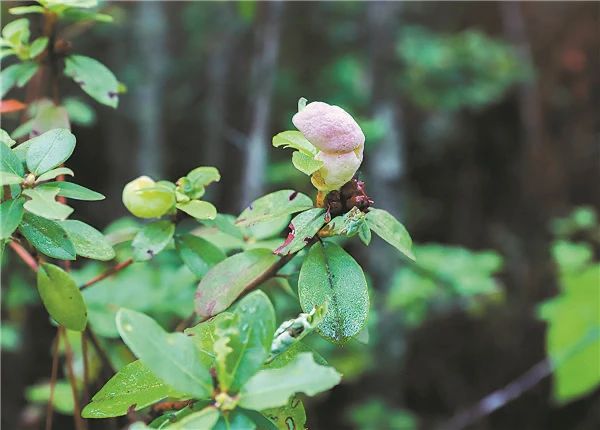
▲Azalea flowers are everywhere in the forest. [Photo by Wang Jie/For China Daily]
If any anomaly is registered, such as illicit logging or a pest attack, He and his team will intervene immediately and report it to related departments in a bid to nip it in the bud.
"During dry and windy periods, we have to keep a special eye out for fire hazards," He says.
He has joined all major ecological construction projects that were aimed to preserve the natural forest and increase forest coverage.
"Our forest zone is very big, with long roads running through it," He says.
"The farmlands and forest are distributed in an interlaced way, so the supervision of farming affairs makes fire control in the forest tough," he adds.
Therefore, He has made a point of hammering home the importance of fire safety to local villagers, who have become familiar with He's regular visits and affectionately call him "Brother Wu".
"We have also established a WeChat group to engage villagers and put up fire-prevention banners to ensure everyone is aware and involved in the cause," He says.
Related rules and punishment measures have also been laid out.
At the same time, Tai'an authorities have arranged specific times for villagers to burn straw or crop residues, with He and others standing by to give guidance and maintain a watchful eye throughout the process.
"By addressing their problems, it has helped endear forest protection work to local residents," He says.
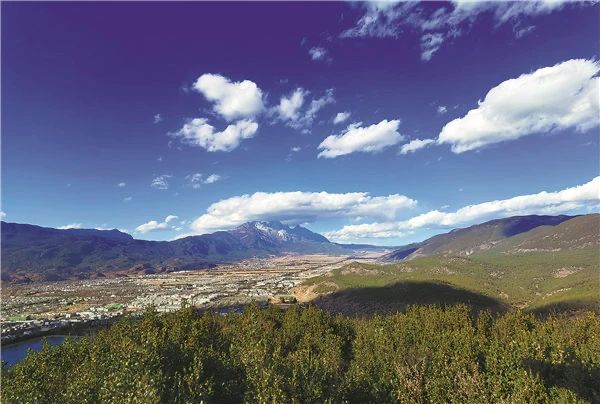
▲A bird's-eye view of Tai'an. [Photo by Wang Jie/For China Daily]
To date, the forest coverage rate has been raised to 67 percent, compared to the 45 percent recorded at the beginning of the 1990s, according to local authorities.
More than 80 percent of the forest is in the young and middle age category, and artificial afforestation has helped to create a forest area of approximately 2,333 hectares, with the main tree species being Pinus yunnanensis, Pinus armandii, spruce and fir.
It is a far cry from the past.
"Local ecological conditions were relatively fragile when I first arrived," He says.
As a result, local people suffered from vegetation destruction and the deteriorating ecological environment.
He Jiming, born and bred in Tai'an, says his childhood memories are marked by howling winds and barren mountains.
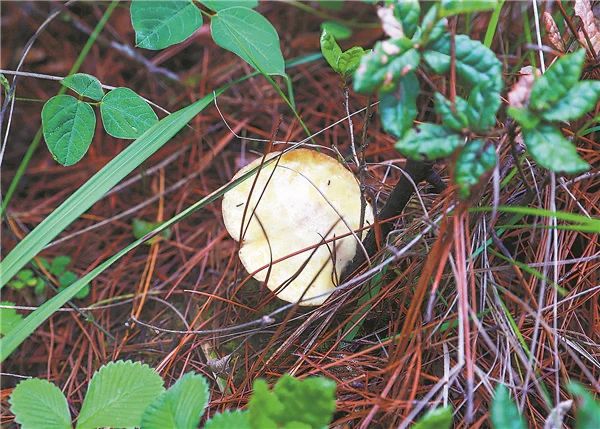
▲The local forest abounds in edible mushrooms. [Photo by Wang Jie/For China Daily]
As He Wu and his team have persistently publicized the need for forest protection, local awareness has grown.
Villages have even developed their own conventions for forest preservation, and residents have taken the initiative to implement them, especially after seeing the commitment of He Wu and his team to protecting the forest.
"Today, those who used to rely on the woods for their livelihoods no longer engage in reckless logging," He Wu says.
Environmental improvement is evident, as indicated by the rising number of wild animals.
"We had never seen the likes of the Lady Amherst's pheasant and dwarf musk deer, but they have been spotted during our forest patrols in recent years," He Wu says.
The restored ecological conditions have, in turn, enabled locals to increase income through harvesting diverse undergrowth resources, particularly under tree crowns.
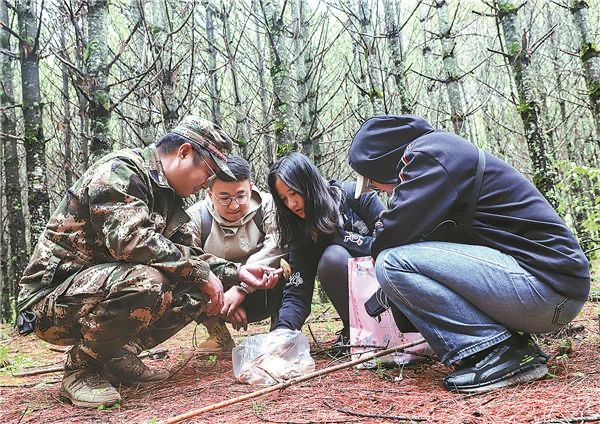
▲He teaches the public how to identify edible mushrooms during the patrol. [Photo by Wang Jie/For China Daily]
"For example, the production of edible fungi has increased, and even Tricholoma matsutake has emerged. As a result, the income of the villagers has also risen," He Wu says.
In addition, with proper roads being laid through the forest, it is more convenient for locals to drive to the top of the mountains to collect dried, fallen pine leaves that can be used as fuel for cooking stoves.
"These positive changes have also encouraged locals to be increasingly supportive and understanding of our work," He Wu says.
He Wu considers that to be the best reward for forest conservation workers like him.
He adds that such outcome has been a great incentive and has increased his sense of responsibility.
From time to time, he goes to a Pinus armandii forest that covers an area of 166.7 hectares.
The special zone is not only a microcosm of the vast forest area in Tai'an, but is a favorite place for him and his colleagues to recharge their batteries after a day's work.
"The leaves rustling in the wind is dulcet and wonderful," He Wu says.
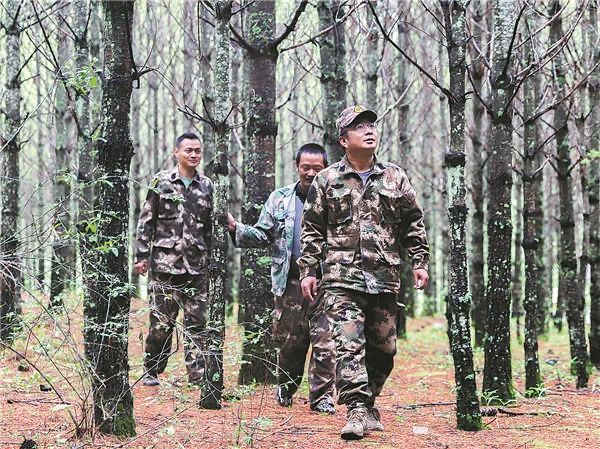
▲Patrolling the forest is a daily routine for He Wu and his colleagues. [Photo by Wang Jie/For China Daily]
More importantly, the place has been a source of energy and encouragement for He Wu and his team.
It was built from scratch through the efforts of three generations of a local family, to which his colleague Yang Guojun belongs.
"His grandfather and father had both served as a protective force for this forest, and their commitment and achievements are inspiring," He Wu says.
"There is a great deal of pride in working with Yang and carrying on the legacy of his forebears," he says.
He Jiming also shares He Wu's sentiment, which he says has fueled his passion for his job.
"The township arranged a tree planting event in this area, and I was about 10 years old and our school joined in," He Jiming recalls.
"The saplings were only 70 to 80 centimeters high, shorter than I was, but look how tall and dense they have become," he says with pride.

▲Yulong snow mountain can be spotted from afar during the forest patrol. [Photo by Wang Jie/For China Daily]
He Wu says: "If anything, my love for forestry has grown, and I have grown attached to more things here.
"I'll probably retire here, God willing," he adds.
Reporter: Yang Feiyue, Li Yingqing








